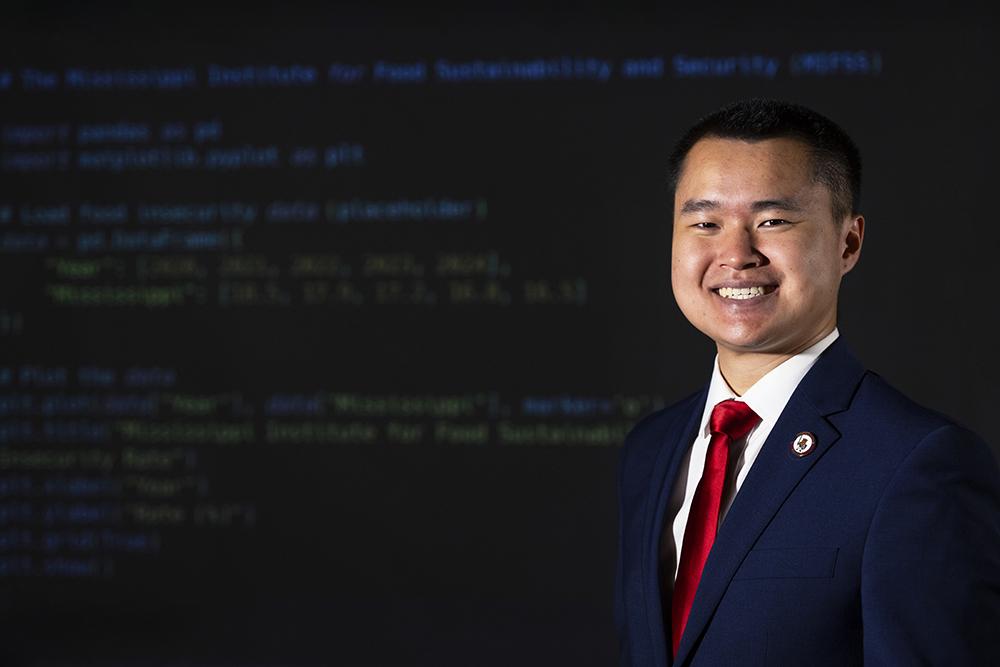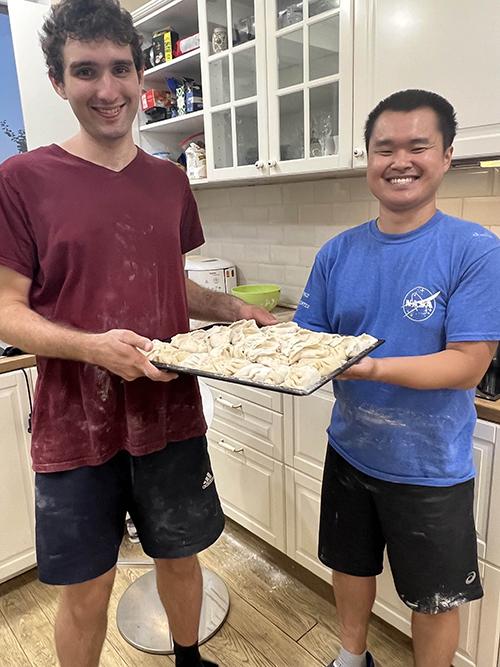Getting nourishment to where it matters: MSU’s Chen addressing food insecurity with Amazon AI, in-state food bank partnership

Contact: Carl Smith
STARKVILLE, Miss.—Devin Chen gained an intimate understanding of how food brings people together as he grew up working in his parents’ Louisville restaurant. Now, the junior cybersecurity major is using skills he’s learning at Mississippi State, artificial intelligence tools powered by Amazon Web Services and a partnership with a far-reaching nonprofit, to bring nourishment to those in need and help alleviate one of the Magnolia State’s biggest issues: food insecurity.
Chen is using AWS Skill Builder to help him plan and design software utilizing machine learning to allow the Hattiesburg-based food bank Extra Table to better recognize need and target its distributions more efficiently using publicly available data and its own organizational inventory lists.
The project is in its conceptual phase, but he expects to deliver a working platform before 2026.
This month, Chen launched the nonprofit Mississippi Institute for Food Sustainability and Security, where he hopes to scale up the project and build a statewide coalition of distributors, farmers, stores and other community partners who will use the software while communicating and coordinating their efforts all on the same network, effectively creating an AI-powered recognition and distribution system.
“In many places in the state, one out of every five people are experiencing some type of food insecurity. One of the biggest misconceptions we have is that it doesn’t affect people we know, but it could be your neighbor that smiles at you every day or the little girl down the street,” said Chen, a previous recipient of the MSU Excellence in Community Engagement Award. “It’s important to have these conversations now, because action starts with initiative, and initiative starts with these conversations.

“The problem right now is, everyone is operating on their own infrastructure, working in their own bubbles and talking in their own languages,” Chen continued. “If we can get everyone on the same page, we can make a massive difference in the lives of thousands of Mississippians.”
As defined by the U.S. Department of Agriculture, food insecurity occurs when people do not have enough to eat and do not have access to reliable sources of food. A 2020 report released by the organization showed more than 38 million people in the U.S., including more than 11 million children, experienced food insecurity that year, a number in line with 2019’s prepandemic figure.
The genesis of Chen’s project came after attending MSU-hosted and -affiliated conferences, including the fourth-annual AI in Agriculture conference, held by the university’s Agricultural Autonomy Institute. A separate event led by the Association of Information Technology Professionals connected him to Mark Scutch, an AWS senior customer solutions manager. After discussing ideas, Scutch invited Chen to an impromptu meeting at a local restaurant with other senior AWS personnel about how to implement them and connect Chen with Extra Table.
“When I first started studying food insecurity, I kept thinking, ‘Why are we not just solving this right away?’ And then you dive in and realize how complex the solutions can be,” Chen said. “We’re talking about infrastructure here, both physical and digital. People do not realize just how difficult it is to coordinate inventory with need and get food from point to point in the fastest, most efficient ways possible.
“A lot of people have asked me why I’m doing this or said it’s too hard to get all of these groups and organizations in the state on the same page, but that just makes me more motivated,” he continued. “Anytime I come across something people don’t want to work on because it’s too difficult, that means I’ve found an untapped niche. That’s something I can pursue. You have to start somewhere; you can’t just throw your hands up and say, ‘I give up.’”
As Chen builds better connections, he praises the ones he’s received through the university and its overall support for helping him get this project off the ground and possibly changing thousands of lives.
“It’s the support from everyone—classmates, faculty and administrators—that really makes a difference. You hear about it when you come here, but it’s an amazing thing to experience. All the departments I reached out to about this idea were incredibly supportive and encouraging,” he said. “There are so many opportunities here at MSU, and I encourage my fellow Bulldogs to take advantage of all they come across during their time here.”
Founded in 2009, Extra Table purchases and distributes healthy, shelf-stable food to its 66 partners across Mississippi at no cost to them. For more information, www.extratable.org.
MSU’s Bachelor of Science in Cybersecurity is a focused undergraduate education program in cyber defense and operations. Using a multidisciplinary approach, the program provides students like Chen with a focused education for evaluating, understanding and solving cybersecurity problems.
MSU is one of only few schools in the country qualified to offer this degree with both defensive and offensive capability, and uniquely qualified in the Southeast.
The MSU Department of Computer Science and Engineering is online at www.cse.msstate.edu and can be found on Facebook, Instagram, X and LinkedIn at @csemsstate. Visit MSU’s Bagley College of Engineering at www.bagley.msstate.edu.
Mississippi State University is taking care of what matters. Learn more at www.msstate.edu.